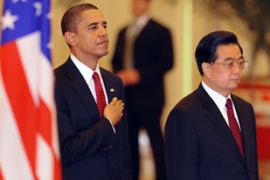Yuan in focus as Obama meets Hu
US president seeks “meeting of minds” at Beijing summit with Chinese leader.

Reducing conflicts
“The notion that we must be adversaries is not predestined,” he said, adding that the world was urgently watching for a “meeting of minds” between the US and China.
Obama has cast his visit as an effort to win trust from a Chinese government and a public often wary of US intentions towards the rising Asian power and world’s third biggest economy.
“I’m hopeful that in my meetings with President Hu … both the United States and China can work together to try to reduce conflicts that are taking place,” he said.
But he also said during the question-and-answer session on Monday that “freedoms of expression and worship, of access to information and political participation, we believe are universal rights”.
“They should be available to all people including ethnic and religious minorities,” he said.
 |
| Obama told Chinese students “universal rights … should be available to all” [Reuters] |
Al Jazeera’s Melissa Chan, reporting from Beijing, said Obama seemed to be making references to the issue of Tibet and the Uighurs, although he did not mention them by name.
The US president’s veiled criticism of China’s human rights record is unlikely to go down well with Beijing and the Chinese authorities moved to limit coverage of his comments at home, blocking his speech online and showing it on only one regional television channel.
A transcript of the session was however posted on the website of the state-run Xinhua news agency.
While the issue of human rights is expected to come up when the two presidents sit down on Tuesday in Beijing’s Great Hall of the People, China’s grand parliament building, economic issues are expected to top the agenda.
Obama is likely to press Hu to allow the appreciation of China’s currency, the yuan, which Washington says is severely undervalued, stoking global economic imbalances.
But Hu has shown little patience for criticism of Beijing’s currency policy, and he and other Chinese officials have focused on what they call the protectionist impulses and lax fiscal policies of the US.
At a gathering of Asia-Pacific leaders in Singapore over the weekend, Hu pointedly ignored international calls for his government to help ease global imbalances by raising the value of the yuan, making Chinese exports relatively more expensive.
‘Big distraction’
Patrick Chovanec, an economics professor at Tsinghua University said that the currency issue was a “red herring”.
“I think it’s a big distraction from some of the more substantial issues that he should be talking about,” he told Al Jazeera from Beijing.
Chovanec said the US faced a very similar situation with Japan in the 1980s, with chronic trade surplus and Japan accumulating currency reserves, and that doubling the yen’s value actually increased the trade surplus.
“If Obama wants to achieve real results, he should be pressing the Chinese on market-oriented reforms that open the Chinese market and help unlock savings in China rather than pressing them on the currency itself,” he said.
For his part, China’s Hu is expected to press his guest over US tariffs on Chinese tyres and preliminary duties on some steel products – moves that Beijing has labelled as protectionist.
Chinese leaders are also likely to seek assurances about how spending policies will affect the already soaring US deficit and the safety of massive Chinese investment in US debt.
Yeliang Xia, an economics professor at Peking University, said Beijing would use such issues as a bargaining chip.
“Washington should have a flexible attitude toward Chinese exports to discourage protectionist actions against China,” he told Al Jazeera.
“So in that way China would do more to balance the trade deficits and also would appreciate the yuan’s value in a more active way.”
China is the largest foreign holder of US government bonds and the US trade deficit with China stood at $22.1 bn in September, the highest level since November 2008, according to US data released last week.